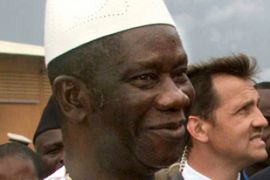Conflicting claims over Guinea coup
Coup leaders claim to have seized power but government insists it is still in control.

Sompare dismissed the coup attempt as involving only a “minority of soldiers and officers”.
News agency Associated Press reported on Tuesday that dozens of armed soldiers were seen heading towards the presidential compound shortly after officers were said to have summoned ministers and officials to a military base.
The coup leaders announced on Wednesday that they would hold “free, credible and transparent elections” by December 2010.
They insisted the military did not “wish to cling on to power” and would only rule for a two-year period to ensure Guinea’s “territorial integrity” was not compromised.
‘Constitution suspended’
Camara, speaking in a radio broadcast on Tuesday, said: “The institutions of the republic have shown themselves to be incapable of resolving the crises which have been confronting the country.
“As of today, the constitution is suspended as well as as political and union activity.”
Witnesses in the capital Conakry told Al Jazeera that a young captain from the presidential guard announced on state radio that “people should stay at home and that the military will take control of the political and econonic situation in the country”.
Police and army personnel were said to be seen everywhere.
Mouctar Diallo, an opposition party leader, said: “I denounce all attempted military coups aimed at overriding the legal institutions and trying to derail the democratic route of the Republic of Guinea.”
Conte died late on Monday in Conakry after a long illness. He was Guinea’s president for 24 years and one of Africa’s longest serving leaders.
Guinea will hold a state funeral on Friday for Conte in his home village of Lansanya, which lies around 100 kilometres north of the capital.
 |
Muzong Kodi, an expert on governance in Africa, told Al Jazeera: “There is a succession plan in the constitution, which clearly sets out the transition period.
“It’s actually the national head of the assembly who is supposed to step in and organise the presidential elections within two months.
“What one can hope for is a transition period led by civilians. The last thing the country needs is a military coup.”
Civil war fears
Al Hassan Sillah, a journalist in Conakry, told Al Jazeera there are widespread fears that the power struggle could spill over into violence, splitting the armed forces and possibly even pushing the country into civil war.
He also said any deterioration in the country could destabilise neighbouring countries.
“Sierra Leone is just a stone’s throw from here and if things degenerate here it would be very easy for it to spill over to there,” he said.
Richard Cornwell, of the Institute for Security Studies in South Africa, said: “What we were really worried about, more than even a coup, was the fact that the army might split and this would result in civil war.
He said the population may be willing to see what came of a new ruling faction, whose members and political stance were still unknown.
The African Union began emergency talks on Wednesday amid fears unrest in Guinea could destabilise the region as a whole.
The United Nations also appealed for calm and stressed the need for a “peaceful and democratic transfer of power in accordance with the consititution”.